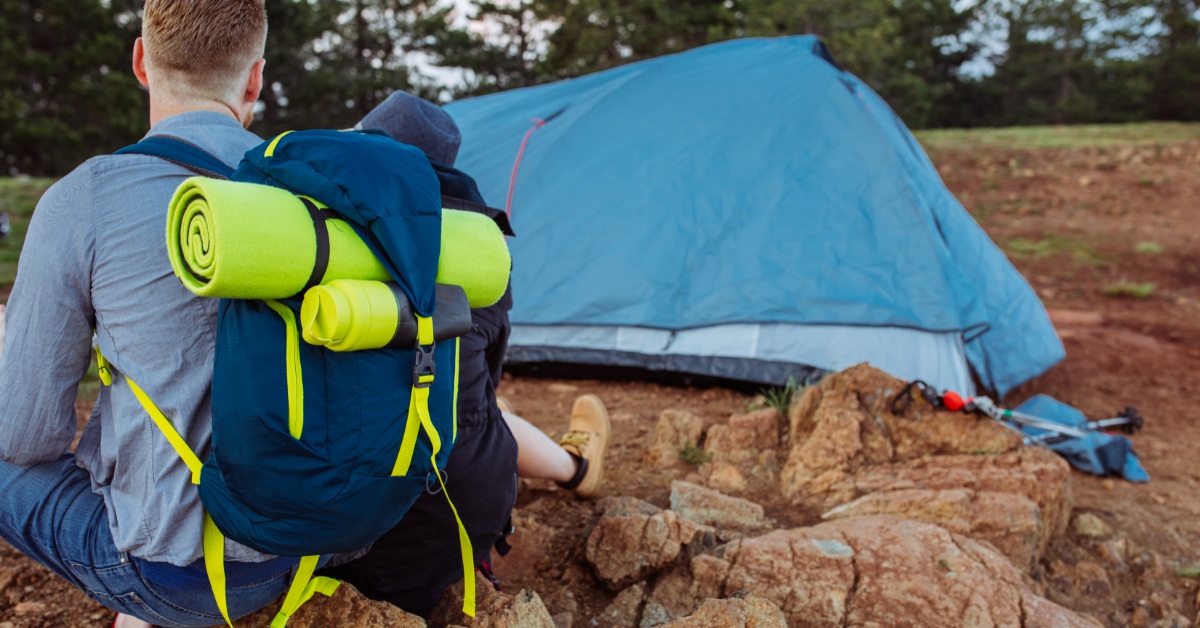How Much Does a Hiking Tent Weigh: The average weight of a hiking tent is around 2-5 pounds. The weight depends on the tent’s size, material, and features.
When planning for an outdoor adventure, the weight of your hiking tent can significantly impact your overall backpacking experience. The average weight of a hiking tent is around 2-5 pounds, but it can vary based on the tent’s size, material, and features.
Carrying a lightweight tent during your hike can reduce fatigue and provide more comfort, while a heavier tent may offer more durability and stability in extreme weather conditions. Understanding the factors contributing to a hiking tent’s weight is crucial for selecting the most suitable option for outdoor endeavors. Additionally, considering your personal preferences, the terrain, and the duration of your trip will help you determine the ideal tent weight for your backpacking adventure.

Credit: gearjunkie.com
Factors Affecting Tent Weight
Material
When considering the weight of a hiking tent, the material it is constructed from plays a crucial role. Lightweight materials such as silnylon, Dyneema, and cuben fiber are favored for their durability and, more importantly, their reduced weight. On the other hand, tents constructed using heavy-duty polyester or heavier-grade nylon often weigh more due to their thicker and denser nature.
Design
The design of a tent can significantly impact its weight. Tents with a freestanding design often include additional poles for support, contributing to their overall weight. Alternatively, non-freestanding tents, which rely on stakes and guylines for support, tend to be lighter in weight. The number of poles, zippers, and extra features such as vestibules and gear storage compartments also affect the overall weight of a tent.
Capacity
The capacity of a tent shall refer to the number of persons who may be accommodated in it. Generally, larger tents are designed to accommodate more people. Due to the other materials, weight tends to be higher. Required for a larger footprint and greater structural support. Single-person or ultralight tents are designed with minimalistic features and lightweight materials to reduce overall weight, making them suitable for solo backpackers.
Ideal Weight For Backpacking Tents
When it comes to backpacking, The weight of your gear can have a significant effect on your overall comfort and enjoyment. One of the most important aspects to consider is the weight of your tent. The ideal weight for backpacking tents is crucial to carry it with your other gear comfortably. Let’s explore the considerations for backpacking and the recommended weight range for backpacking tents.
Considerations For Backpacking
When choosing a backpacking tent, certain considerations are essential to keep in mind. The primary goal is to strike a balance between a lightweight design and sufficient durability and protection. The tent’s weight, material, size, and weather resistance are key factors to consider.
Recommended Weight Range
The recommended weight range for backpacking tents typically falls between 2 to 4 pounds. This weight range ensures that the tent is lightweight enough to carry comfortably yet robust enough to provide adequate protection in various weather conditions. Ultralight tents weigh as little as 2 pounds or less, making them ideal for thru-hiking and minimalist backpacking. On the other hand, slightly heavier tents, around 4 pounds, may offer more space and features without compromising too much on weight.
Ultralight Tents Vs. Traditional Tents
Ultralight tents are a popular choice for hiking due to their lightweight construction, weighing around three pounds or less. Traditional tents can be heavier, making them less ideal for long hikes.
Hiking and backpacking require carrying your gear long distances, so every ounce matters. Ultralight tents have gained popularity among outdoor enthusiasts due to their lightweight design, making them an excellent option for those looking to reduce the weight they carry on their adventures. However, traditional tents also have their own advantages and drawbacks. Let’s take a closer look at the benefits and drawbacks of ultralight tents.
Benefits Of Ultralight Tents
- Lightweight: Ultralight tents are designed to be as light as possible without compromising durability and functionality. They are made using lightweight materials and innovative construction techniques, resulting in a significantly reduced weight compared to traditional tents.
- Easy to Carry: The lightweight nature of ultralight tents makes them much easier to carry during long hikes or backpacking trips. They can be packed down to a small size and fit perfectly in your backpack, allowing you to move more efficiently and reducing strain on your body.
- Quick Setup: Most ultralight tents feature a simple and straightforward setup process. This means you can quickly pitch your tent and enjoy your campsite without wasting time and energy struggling with complicated setup instructions.
- Versatility: Ultralight tents are designed for various weather conditions, including rainy days and windy nights. They are typically equipped with advanced waterproofing and wind-resistant features to keep you dry and protected in challenging outdoor environments.
Drawbacks Of Ultralight Tents
- Less Space: Ultralight tents are designed to be lightweight, but this often means sacrificing interior space. They may have a smaller floor area and lower headroom than traditional tents. If you prefer more room to move around or enjoy extra comfort during your camping trips, this could be a drawback to consider.
- Less Durability: While ultralight tents are engineered to be lightweight, they may not be as durable as their conventional counterparts. The lightweight materials used in construction may be more prone to tears and abrasions, especially in harsh outdoor conditions.
- Higher Cost: Their advanced lightweight design and specialized materials make ultralight tents more expensive than traditional tents. Investing in an ultralight tent may require careful consideration if you are on a tight budget.
Comparing Popular Hiking Tent Models
Looking for a lightweight hiking tent? Diverse models like Marmot Tungsten, Big Agnes Seedhouse, and NEMO Hornet Elite OSMO offer weights ranging from 2. 5 to 4 pounds. Consider the weight carefully for ease of transport on your hiking adventures.
Marmot Tungsten
The Marmot Tungsten hiking tent is a popular choice for outdoor enthusiasts. Weighing in at approximately 4.5 pounds, it strikes a balance between weight and durability. It features a freestanding design, allowing for easy setup and stability on uneven terrains. The rain fly is made of durable polyester fabric, providing reliable protection against the elements. The Marmot Tungsten is a reliable option for hikers seeking a lightweight tent without compromising quality and comfort.
Big Agnes Seedhouse Tent
The Big Agnes Seedhouse Tent is another top contender in the hiking tent market. With a weight of around 3 pounds, it is an ultralight option for backpackers looking to minimize their load. Despite its lightweight construction, the Seedhouse Tent doesn’t skimp on space or features. It offers enough room for two people and has a vestibule for gear storage. The tent’s DAC Featherlite poles provide excellent stability, while the nylon ripstop rainfly ensures protection from rain and wind. The Big Agnes Seedhouse Tent is perfect for hikers who prioritize weight reduction while enjoying a comfortable camping experience.
Hyke & Byke Yosemite Hiking & Backpacking Tent
The Hyke & Byke Yosemite Hiking & Backpacking Tent is a budget-friendly option that doesn’t compromise quality. Weighing just under 3 pounds, it is a lightweight choice for backpackers. This freestanding tent can comfortably accommodate two people and features two doors for easy entry. The polyester rainfly and bathtub-style floor provide excellent weather protection, ensuring a dry and comfortable camping experience. The Hyke & Byke Yosemite Tent is affordable for hikers who want to optimize weight and budget without sacrificing performance.
Nemo Hornet Elite Osmo Tent
The NEMO Hornet Elite OSMO Tent is a high-performance hiking tent designed for ultralight backpacking. Weighing approximately 2 pounds, it is one of the lightest options on the market. Despite its featherweight construction, this tent offers ample living space for one person and has two vestibules for gear storage. The Hornet Elite OSMO features a unique single-pole design, maximizing interior space and minimizing weight. The tent’s materials, including a high-denier nylon floor and silicone-treated ripstop rainfly, ensure durability and weather resistance. The NEMO Hornet Elite OSMO Tent is perfect for solo hikers seeking the ultimate lightweight option without compromising quality or performance.
Msr Hubba Hubba Nx
The MSR Hubba Hubba NX is a popular choice among backpackers and hikers. Weighing around 3.5 pounds, it balances weight and functionality well. This freestanding tent comfortably sleeps two people and features two doors and vestibules for easy entry and gear storage. The tent’s materials, such as the nylon ripstop rainfly and bathtub-style floor, provide exceptional weather protection. The MSR Hubba Hubba NX is a reliable option for hikers who prioritize a balance between weight, durability, and comfort.
Each of these tents offers different features and benefits, catering to the needs of various hikers and backpackers. Choosing the right hiking tent can enhance your outdoor experience while keeping your pack weight to a minimum.
Tips For Reducing Tent Weight
When hiking, reducing tent weight is crucial. If you want to use materials like silnylon or cuben fiber, consider a two-person tent for sharing loads; choose minimal and lighter designs that don’t compromise durability. These tips will help trim extra weight without compromising comfort or safety during outdoor adventures.
Choose Lightweight Materials
When it comes to reducing the weight of your hiking tent, one of the most effective strategies is to choose lightweight materials. The overall weight of the tent may be significantly reduced by choosing materials like nylon or Dyneema whilst maintaining its durability.
Opt For Minimalist Designs
Another way to cut down on tent weight is to opt for minimalist designs. These designs typically have fewer features and excess fabric, resulting in a lighter tent. Look for tents with a simple, streamlined structure that provides adequate protection and comfort.
Consider Sharing Gear
If you are hiking with a partner or a group, consider sharing gear to reduce the weight of your tent further. Instead of each person carrying their own individual tent, consider using a larger tent that can accommodate multiple people. This reduces weight, promotes camaraderie, and saves space in your backpack.
Credit: gearjunkie.com

Credit: www.amazon.com
Frequently Asked Questions Of How Much Does A Hiking Tent Weight
Is 4 Lbs Heavy For A Backpacking Tent?
A backpacking tent weighing 4 lbs is considered relatively heavy. Aiming for a tent that weighs around 3 lbs or less is recommended to have a lighter backpacking load.
Is A 5 Pound Tent Too Heavy For Backpacking?
A 5-pound tent may be considered too heavy for backpacking. Choosing a tent weighing around 3 pounds or less for backpacking is recommended. Lighter options are available for those who want to minimize weight.
Is 6 Pounds Too Heavy For A Backpacking Tent?
An average backpacking tent weighing 6 pounds may be considered heavy compared to the lighter options available. Struggling for a tent weighing around 3 pounds or less is recommended for a more comfortable backpacking experience.
What Is Considered Heavy For A Tent?
A heavy tent typically weighs above average and can vary depending on the type and size. It’s best to aim for a backpacking tent that weighs about three pounds or less for easier portability. Lighter options are available for those who prioritize minimizing weight.
Conclusion
Choosing the right hiking tent weight is important for a successful outdoor adventure. As we have discussed in this blog post, the weight of a hiking tent can vary depending on factors such as the number of people it can accommodate, the season it is designed for, and the materials used.
Finding a balance between weight and durability is crucial to ensure a comfortable and safe hiking experience. When selecting a hike, take into account your particular needs and priorities. Tent, and remember that a lightweight tent can significantly affect your overall load.
Happy hiking!

